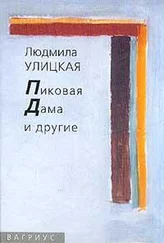That day Medea was wearing a grey serge dress with a round white collar and cuffs which made her look like a chambermaid or an old-age pensioner; one of the probably one hundred dresses of exactly the same style which she had worn all her life since she was a schoolgirl and which she could have sewn with her eyes shut: one of those widow’s dresses which she was wearing to this day.
The evening at the Caucasus restaurant was a delight. Samuel Yakovlevich was trying to cut a bit of a dash. He knew the waiter and was pleased about that. Bending at the waist and lifting his sharp little mustache with a smile, the waiter cast hors d’oeuvres in little transparent dishes down on the table in a casual but symmetrical cross. Among the plush and the palm trees of the restaurant, Medea Georgievna seemed more attractive to the dentist than yesterday when she had been sitting in his little garden with her classical Greek profile silhouetted against the whitewashed wall.
Breaking off a piece of lavash bread, she dipped it in the chakhokhbili stew and ate it so delicately that she didn’t get the slightest orange outline around her mouth. Watching the relaxed and amiably absentminded look on her face as she was eating, hardly looking down at the plate, he supposed that she had good manners and it struck him that he himself had never been taught good table manners. He quite lost his appetite for a minute. The chakhokhbili suddenly seemed bitter.
He moved the metal bowl and plate to one side. He refilled his wineglass with dark, heavy Khvanchkara from the round decanter, gulped it down, put the glass back on the table, and said emphatically, “You keep eating, Medea Georgievna, and pay no attention to what I am about to say.”
She looked at him expectantly. It was cosy in the niche where they were sitting, if a bit on the dark side.
“I need to explain my behavior yesterday to you. I mean at the meeting. Bear in mind that I am a professional revolutionary. I was known throughout Odessa and spent three years in political exile. I tried to organize the escape from prison of someone so important that it would be simply improper to mention his name now. And I am no coward, believe me.”
He was very agitated now, moved the plate of chakhokhbili back, impaled a large piece of meat, and chewed at it, smacking his lips like a gourmet. His appetite had evidently returned.
“You see, I simply have a nervous i-illness.” He moved the plate away again. “I am thirty-nine years old: no longer young, but not yet old. I have no contact with my family. I am as good as orphaned,” he joked.
He leaned forward, and some of his thick hair, which he combed back, tumbled onto his forehead. His hair really was very attractive.
“He’s going to propose,” Medea surmised.
“I have never been married and, just between ourselves, had no intention of changing that. Only, you see, I had a slight attack yesterday, when we were sitting in that meeting, and purely because you were there it passed off quite without any consequences. Then you came home with me and we sat together all evening and I didn’t feel a thing.”
“He’s so daft it’s comical,” Medea thought, smiling to herself.
“You see,” the dentist battled on, “you really aren’t my type at all . . .”
Such frankness seemed, even to someone as devoid of flirtatiousness as Medea, to be going too far, but by now she was completely at sea and had no idea where this conversation was leading. Then the dentist made an abrupt turn, as if twisting his molar forceps: “In general I like smaller women, solid, firmly planted, you know, on the ground in the Russian style. No, don’t think I’m a simpleton, I realize that you are something of a princess, but since I was a young man I haven’t been accustomed to looking in the direction of princesses. Laundresses, cafeteria assistants, forgive me, nurses . . .”
“He is a scream, but I have a pile of laundry at home waiting to be ironed,” she thought. Samuel Yakovlevich speared a piece of the by now cold meat with his fork, hastily chewed and swallowed it, and now Medea could see how nervous he was.
“When you took my hand, Medea Georgievna . . . No, forgive me, it was I who took your hand, I felt that by your side I feared nothing. The whole evening I felt nothing for you, only that by your side I feared nothing. I escorted you back, then I came back home, lay down, and decided immediately that I must marry you.”
The information left Medea completely unmoved. She was an old maid of twenty-nine and for many years had contemptuously rejected propositions of various kinds made to her by a rather small number of men.
“And then I dreamed of my mother!” he exclaimed dramatically. “If you only knew what a dreadful personality she had, but that’s beside the point. I have never in my life dreamt of her before, but last night I did. She came very close to me, and I could even smell her hair, you know, her old grey hair, and she said to me sternly, ‘Yes, Sam, yes.’ And that was it. I can only think myself that it’s ‘yes.’ ”
Medea was sitting bolt upright. She always did carry herself very upright. Her collar was slightly crumpled on the left, but she did not notice it. She was wondering how to turn this eccentric down gently, so as not to offend him. It didn’t seem to have occurred to him that she might say no.
“Yes, Medea Georgievna, and there is one more thing I should tell you about myself as your future husband. The point is, I am a certified psychiatric patient. That is, I am perfectly all right. It is an old story, but I should nevertheless tell it to you. In 1920, I was drafted into a subdivision of the ChON Special Detachments and sent out to requisition grain. It was a matter of the highest priority, I always understood that. And grain, of course, we duly found in the village of Vasilishchevo in Tambov province. I am quite sure there was grain hidden in every homestead, but we found it in two, which didn’t at all look to be among the richest. We had our orders: anyone found concealing grain was to be shot as an example to others. The Red Army soldiers arrested three peasants and took them outside the village boundary. As they were taking them away, all the people of the village followed. Two of the men were brothers with a shared farm, and the other was an older peasant. Their wives were running after us, and their children. An old paralyzed woman, the mother of the older man, was crawling after us. We took away a hundredweight and a half of grain from them in total, and from the brothers a measly half a hundredweight. There was I, Medea Georgievna, the commanding officer of the grain squad. We lined the three of them up, the Red Army soldiers facing them with their rifles. Well, then the women and the little children raised such a shriek that something struck me in the head and I fell down. I’d had something like an epileptic seizure. After that, of course, I remember nothing. They put me in the cart, right there on top of the grain, and took me back to the city. I was told I turned black, and my arms and legs were like sticks, completely rigid. Three months I was in the hospital, and then they sent me to a sanatorium and then set up a commission and decided that I had weak nerves. After the commission they wanted to transfer me to work for the Party administering the economy, but I had second thoughts and asked them to let me be a dentist. They took my weak nerves into account and released me. You may perhaps have noticed that I am a good dentist. I know the prophylactic side, and all about dentures. I have not changed my Party views, only physically I really am weak. Whenever I need to support a Party decision, my spirit is all for it, but my flesh relapses into weakness and fear that I might be about to have another fit, a nervous fever . . . like at yesterday’s meeting. I am telling you all this as a very big personal secret, although actually it’s all written down in my medical record. I had an opportunity to have it removed, but I thought, ‘No, I’m not going to. What if the Party were to call me again to do my duty in operational work. I just can’t do it. Shoot me like a dog, but I still can’t do it.’ But I have no other failings, Medea Georgievna.”
Читать дальше




![Людмила Улицкая - Сквозная линия [litres]](/books/393468/lyudmila-ulickaya-skvoznaya-liniya-litres-thumb.webp)





